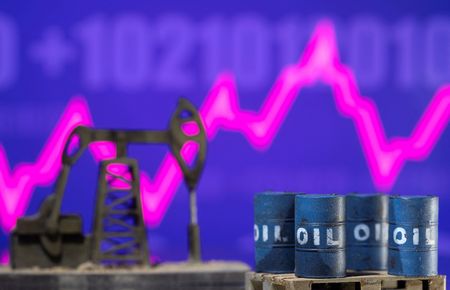 1
1 1
1

By Noah Browning
LONDON (Reuters) -Oil prices surged on Wednesday as supply disruptions mounted following sanctions on Russian banks amid the intensifying Ukraine conflict, while traders scrambled to seek alternative oil sources in an already tight market.
Brent crude futures rose by nearly $9, touching a peak of $113.94 a barrel, the highest since June 2014, before easing to $113.07, up by $8.10 or 7.7% by 1330 GMT.
U.S. West Texas Intermediate (WTI) crude futures jumped more than $9 to $112.51 a barrel, hitting the highest since August 2013 before losing some steam to trade up $7.74 or 7.5% to $111.15 a barrel.
“Investors, traders, and politicians alike are scrambling to address the worsening Russia-Ukraine standoff. The initial upward price reaction after the conflict in Ukraine started six days ago is only intensifying,” said Rystad Energy analyst Louise Dickson.
“The current realistic scenario is that a large portion of Russian crude oil, as well as refined oil products, will no longer be palpable to the market and create a supply deficit for the duration of the armed conflict.”
Trade in Russian oil was in disarray as producers postponed sales, importers rejected Russian ships and buyers worldwide searched elsewhere for crude as Western sanctions and pullouts by private companies squeezed Russia.
Russian oil exports account for around 8% of global supply.
Exxon Mobil on Tuesday said it would exit Russia oil and gas operations as a result of Moscow’s invasion of Ukraine. The decision will see the firm pull out of managing large production facilities on Sakhalin Island in Russia’s Far East.
The Organization of the Petroleum Exporting Countries, Russia and allies, together known as OPEC+, agreed on Wednesday to again raise their monthly output by 400,000 barrels per day.
U.S. President Joe Biden warned Vladimir Putin that the Russian leader “has no idea what’s coming” in a State of the Union speech dominated by Russia’s invasion of Ukraine.
Meanwhile, a coordinated release of 60 million barrels of oil by International Energy Agency member countries agreed on Tuesday failed to reassure the market, and prices rose after the announcement.
In a move likely to exacerbate global supply tightness, buyers are avoiding oil from the CPC pipeline originating in Kazakhstan, source of over 1% of the world’s supply, due to sanctions concerns.
(Additioanl reporting by Sonali Paul in Melbourne and Muyu Xu in Beijing; editing by Jan Harvey and Jason Neely)